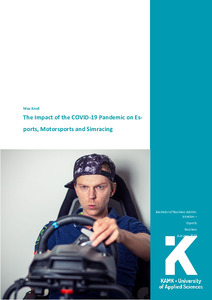The Impact of the COVID-19 Pandemic on Esports, Motorsports and Simracing
Knoll, Max (2023)
Julkaisun pysyvä osoite on
https://urn.fi/URN:NBN:fi:amk-2023122839172
https://urn.fi/URN:NBN:fi:amk-2023122839172
Tiivistelmä
This thesis discusses the complex effects of the Coronavirus pandemic on esports, motorsports, and sim racing, three unmistakable however interconnected domains of sports and entertainment. Before the pandemic, esports, motorsports, and sim racing had novel qualities and directions. Esports were in a de-velopment direction, motorsports were internationally settled with a committed fan base, and sim racing had consistently acquired prevalence.
The pandemic affected sports and entertainment, prompting the abolishing and rescheduling of conven-tional sports. Accordingly, esports progressed to remote organisations, required changes in event struc-tures, expanded watcher engagement through streaming, and caused changes in sponsorship elements. Motorsports embraced virtual races, integrating innovation into racing and contrived inventive systems to keep up with fan engagement amid void grandstands. Sim racing encountered a surge in popularity, over-coming any issues between reenactment and reality.
This thesis recognised illustrations learned and patterns arising through a comparative examination, offer-ing meaningful experiences for industry partners exploring the developing games and entertainment sce-ne impacted by the extraordinary impacts of the pandemic
The pandemic affected sports and entertainment, prompting the abolishing and rescheduling of conven-tional sports. Accordingly, esports progressed to remote organisations, required changes in event struc-tures, expanded watcher engagement through streaming, and caused changes in sponsorship elements. Motorsports embraced virtual races, integrating innovation into racing and contrived inventive systems to keep up with fan engagement amid void grandstands. Sim racing encountered a surge in popularity, over-coming any issues between reenactment and reality.
This thesis recognised illustrations learned and patterns arising through a comparative examination, offer-ing meaningful experiences for industry partners exploring the developing games and entertainment sce-ne impacted by the extraordinary impacts of the pandemic
